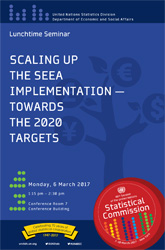United Nations Statistical Commission
Overview 48th Session (2017) Side Events
Lunchtime Seminar
Scaling up the SEEA Implementation Towards the 2020 targets
- Monday, 6 MAR 2017
- 1:15 - 2:30pm
- Conference Room 7 (CB)
Meeting organized by UNSD
The United Nations Statistical Commission (UNSC) adopted the SEEA Central Framework as an international statistical standard at its forty-third session in February 2012. At its forty-fifth session in 2013, the Commission then recognized the SEEA Experimental Ecosystem Accounting as an important framework for the measurement of ecosystems, and encouraged countries to start experimenting with the new framework. During the same session the Commission adopted the implementation strategy of the SEEA Central Framework, prepared under the auspices of the United Nations Committee of Experts on Environmental Economic Accounting (UNCEEA).
The Global Assessment of Environmental-Economic Accounting 2014 indicated that 54 countries have an established a programme on environmental-economic accounting, and an additional 15 countries are planning to establish one in the short term. This represents a 31 percent increase since the global assessment undertaken in 2006. Modules compiled differ between developed and developing countries. In developed countries, the choice of accounts is shaped largely by EU legislation, covering air emissions, environmental taxes and material flows (in the first phase); and environmental protection expenditure, environmental goods and services sector, and physical energy flow accounts (in a second phase). In developing countries, existing activities and future plans are largely linked to water and energy accounts.
In reflection of the importance of the SEEA as an integrated framework to support measurement of sustainable development, and its role as 'an important statistical framework for the post- 2015 development agenda and the sustainable development goals indicators' (UNSC 45, 2014), the UN Statistical Commission at its 46th session in 2015 'Urged the Committee of Experts to advocate for and promote the scaling up of its implementation programme, exercising strong leadership in developing a concrete and well-resourced programme to support countries in implementing SEEA, with a clear timeline of objectives and deliverables'. In response, the UNCEEA updated its implementation strategy to place the SEEA implementation in the broader context of the current statistical agenda, particularly as a result of the adoption the set of SDG indicators by the UN Statistical Commission.
The updated implementation strategy aims to better respond to implementation needs by anchoring the strategy in the new policy environment and making deeper links to other policy initiatives, such as natural capital accounting, green economy/green growth, sustainable consumption and production and sustainability reporting by businesses. The strategy also reflects the central role that SEEA plays in emerging statistical initiatives, such as the transformative agenda and the modernization of the statistical system, as well as big data in support of official statistics. In addition, the updated strategy extends coverage to not only include the SEEA Central Framework but also SEEA Experimental Ecosystem Accounting. This reflects the holistic approach of developing an information system in support of sustainable development. The strategy still maintains the recommendation that countries adopt a modular approach to implementation based on national policy priorities.
The updated strategy recommends the following targets for SEEA implementation by 2020;
- At least 100 countries with ongoing, well-resourced programmes in SEEA Central Framework accounting; and
- At least 50 countries with ongoing, well-resourced programmes in ecosystem accounting to support national decision-making;
Presentations
- Mr. Bert Kroese, Chair of the United Nations Committee of Experts on Environmental-Economic Accounting (UNCEEA)
- Mr. Stig Johansson, Program Manager WAVES Environment Global Practice World Bank
- Mr. Ben Paul Mungyereza, Executive Director Uganda Bureau of Statistics
- Mr. Kecuk Suhariyanto, Chief Statistician, BPS-Statistics Indonesia
